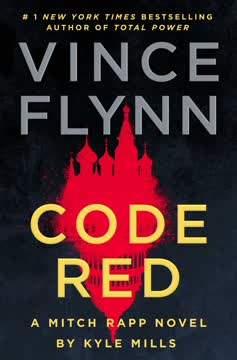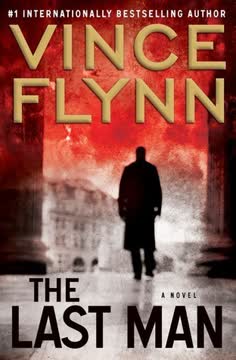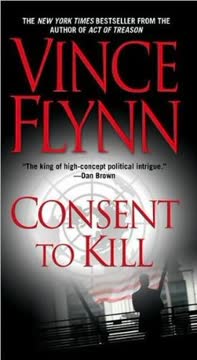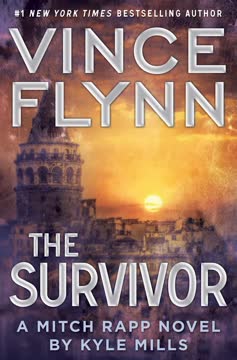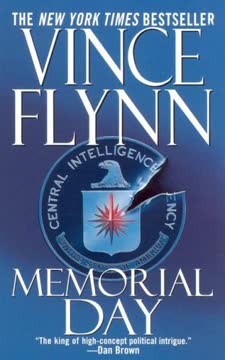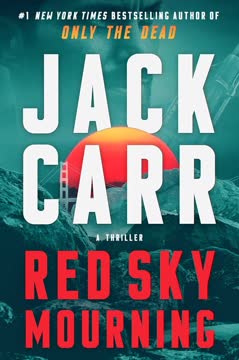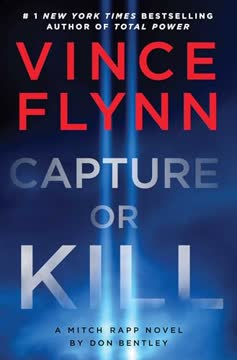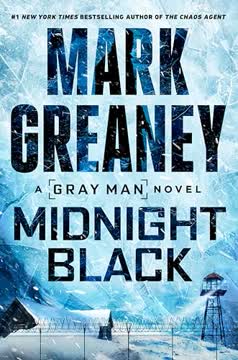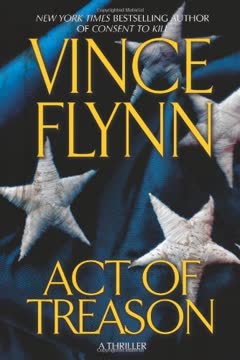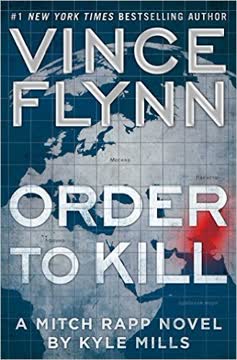Plot Summary
Guantanamo's Deadly Release
In the dead of night, five of the most dangerous detainees at Guantanamo Bay are quietly released under mysterious circumstances. Among them is Philippe Roussard, a legendary sniper and terrorist. The U.S. government, believing it can track the men via radioactive isotopes in their blood, lets them go as part of a secret deal. But the plan backfires: the prisoners are freed, their blood is transfused mid-flight, and they vanish. Roussard, now untraceable, is unleashed with a singular purpose—revenge. This clandestine act, meant to protect American children from a terrorist threat, instead sets a new, more personal terror in motion.
Blood on the Door
Six months later, counterterrorism operative Scot Harvath's world is shattered when his girlfriend, Tracy, is shot outside his home. The attack is marked by a chilling message: blood painted above his door, a shell casing, and a note promising blood for blood. Tracy falls into a coma, and Harvath is consumed by guilt and rage. The attack is not random; it is a calculated, personal assault, and the clues point to a professional assassin with a vendetta against Harvath. The government's refusal to let him investigate only deepens his resolve to find the perpetrator.
Love and Loss
As Harvath keeps vigil at Tracy's hospital bedside, his past and present collide. He reflects on his career, his lost father, and the rare connection he found with Tracy. The attack on her is just the beginning. Soon, his mother is brutally assaulted in California, left blinded and traumatized, and other friends and loved ones are targeted in increasingly sadistic ways. The pattern is clear: someone is systematically attacking everyone Harvath cares about, using methods inspired by the biblical plagues of Egypt.
Presidential Orders
Harvath's investigation is stymied at every turn by President Rutledge, who orders him to stand down and let official teams handle the case. The President's refusal to share information or allow Harvath's involvement is suspicious, especially as evidence mounts that the attacks are personal and connected to a secret government deal. Harvath's trust in the administration erodes, and he becomes convinced that the President is hiding something critical about the released detainees.
Sidelined and Defiant
Refusing to be sidelined, Harvath turns to his own network of allies, including Tim Finney and the Sargasso Intelligence Program in Colorado. With their help, he uncovers a web of secrets, including the involvement of a shadowy information broker known as the Troll. As Harvath digs deeper, he discovers that the attacks are orchestrated by one of the released detainees, but the government's silence and obstruction force him to operate outside the law, making him a fugitive.
The Troll's Web
Harvath leverages the Troll's vast intelligence network to trace the assassin. Their uneasy partnership is fraught with mutual distrust, but yields critical breakthroughs. The Troll, motivated by self-preservation and old loyalties, helps Harvath identify the pattern of attacks and the biblical symbolism behind them. Together, they uncover that the killer is not acting alone, but is part of a larger, more personal vendetta tied to Harvath's past operations against terrorist organizations.
Plagues of Vengeance
The assassin's attacks mirror the ten plagues of Egypt, each one targeting someone close to Harvath and escalating in brutality. From blood and locusts to boils and darkness, the killer's methods are both symbolic and sadistic. The pattern reveals a twisted logic: the killer is not just seeking revenge, but is sending a message, using Harvath's loved ones as proxies for his own pain and loss. The government's hands are tied by a secret bargain, leaving Harvath alone to stop the next plague.
The Hunt Begins
With official channels closed, Harvath embarks on a global manhunt, following leads from Mexico to Brazil and beyond. He uncovers the identities of the other released detainees, but the trail always leads back to one man: Philippe Roussard. As Harvath closes in, he realizes that Roussard's vendetta is deeply personal, rooted in a legacy of terror and betrayal that stretches back to Harvath's own covert operations.
The Sargasso Solution
At the Sargasso facility, Harvath and his allies use cutting-edge intelligence and black-market contacts to outmaneuver both the assassin and the government. They hack financial networks, trace money flows, and exploit the Troll's connections to uncover Roussard's plans. The team's efforts reveal that the attacks are not just about revenge, but are part of a larger scheme orchestrated by a hidden puppeteer with ties to Harvath's past.
The Fifth Name
The investigation reveals that there were not four, but five men released from Guantanamo. The fifth, Roussard, is the son of Adara Nidal, herself the daughter of infamous terrorist Abu Nidal. Roussard's vendetta is both personal and inherited, driven by a desire to avenge his mother's death—a death Harvath played a role in during a past operation. The true mastermind, however, is revealed to be Ari Schoen, Adara's former lover and Roussard's grandfather, manipulating events from the shadows.
The President's Bargain
The truth behind the detainees' release is exposed: the President, under threat of mass child murder, negotiated with terrorists to free the five men in exchange for the lives of American schoolchildren. The deal included a promise never to pursue or harm the released men, a promise now endangering countless innocents as Roussard's rampage continues. Harvath's actions threaten to unravel the fragile peace, but he refuses to let bureaucratic guilt paralyze him.
The Omega Team
Branded a traitor, Harvath is pursued by a CIA Omega Team led by Rick Morrell and tasked with stopping him by any means necessary. As he evades capture, he must also race against time to prevent the final, most devastating attack. The government's inability to act, bound by its own secret bargain, leaves Harvath as the only line of defense against a killer who knows him better than anyone.
The Final Plague
Roussard's ultimate plan is revealed: an attack on a high-profile wedding attended by the President and many of Harvath's friends, including Meg Cassidy. Using a speedboat armed with a Vulcan cannon, Roussard intends to turn the waters of Lake Geneva red with blood, fulfilling the last plague. Harvath, with the help of old allies and a last-minute intervention, manages to intercept the attack in a dramatic boat chase and confrontation.
Lake of Blood
In a climactic battle, Harvath rams Roussard's boat, preventing the massacre. The two men fight in the water, and Harvath finally kills Roussard, ending the cycle of vengeance. The attack is thwarted, but not without cost—lives are lost, and Harvath is left to grapple with the consequences of his actions and the government's moral compromises.
The Last Confrontation
Harvath traces the money and the plot back to Ari Schoen, the disfigured former Mossad agent and Roussard's grandfather. Schoen's twisted quest for revenge against Adara Nidal and his own family led him to manipulate Roussard into targeting Harvath. In a final confrontation, Harvath refuses to kill Schoen, leaving him to live with the consequences of his actions. The Troll, ever the opportunist, finishes the job with a remote-detonated bomb.
Unmasking the Puppeteer
The layers of manipulation are revealed: Schoen's desire for revenge, the President's impossible bargain, and the government's willingness to sacrifice individuals for the greater good. Harvath's personal losses are set against the backdrop of national security, raising questions about loyalty, justice, and the true cost of fighting terror. The cycle of vengeance is shown to be self-perpetuating, with each act of violence breeding new enemies.
Aftermath and Reckoning
With the immediate threat ended, Harvath is cleared of treason but remains disillusioned with the government he served. He tends to his wounded loved ones, including Tracy, who miraculously survives, and begins the slow process of healing. The President seeks reconciliation, but Harvath is changed, burdened by guilt and the knowledge that the war on terror is as much about personal choices as it is about national policy.
Characters
Scot Harvath
Harvath is a former Navy SEAL and counterterrorism operative, defined by his loyalty, resourcefulness, and deep sense of personal responsibility. His relationships are his greatest vulnerability, and the attacks on his loved ones push him to the brink. Harvath's psychological complexity is rooted in guilt over past losses and a relentless drive to protect those he cares about, even at the cost of his own freedom. Over the course of the novel, he evolves from a government asset to a rogue agent, forced to confront the limits of loyalty and the price of vengeance.
Philippe Roussard (Sabri Khalil al-Banna)
Roussard is a legendary sniper and the son of Adara Nidal, herself the daughter of Abu Nidal. Raised in violence and abandonment, he is a sociopath whose actions are driven by a twisted sense of family honor and revenge. His attacks are both personal and symbolic, targeting Harvath's loved ones in a calculated pattern. Roussard's psychological profile is marked by a lack of empathy, manipulativeness, and a deep-seated rage inherited from his family's legacy of terror.
The Troll (Nicholas)
The Troll is a dwarf with a traumatic past, operating as a broker of secrets and classified information. His loyalties are fluid, dictated by self-interest and old debts. He is both ally and adversary to Harvath, aiding him when it serves his purposes. The Troll's psychological makeup is shaped by childhood abuse, a need for control, and a surprising capacity for loyalty to those he considers friends. His relationship with Roussard is complicated by family ties and past betrayals.
President Jack Rutledge
Rutledge is the President of the United States, forced into an impossible bargain with terrorists to save American children. His decisions are driven by a desire to protect the nation, but the moral cost of his actions haunts him. Rutledge's relationship with Harvath is strained by secrecy and betrayal, and his psychological burden is the knowledge that every choice has unintended consequences.
Tim Finney
Finney is a former fighter and the owner of the Sargasso Intelligence Program, a private intelligence and training facility. He is fiercely loyal to Harvath, providing resources and support when official channels fail. Finney's pragmatism and patriotism make him a valuable ally, and his psychological resilience is matched by a willingness to bend the rules for the greater good.
Gary Lawlor
Lawlor is Harvath's boss and a father figure, torn between duty to the government and loyalty to Harvath. He provides guidance and support, but is ultimately constrained by the system. Lawlor's psychological struggle is the tension between institutional loyalty and personal ethics.
Tracy Hastings
Tracy is Harvath's girlfriend, a former Navy EOD tech who survives a near-fatal attack. Her resilience and humor are sources of strength for Harvath, and her recovery becomes a symbol of hope amid the darkness. Tracy's psychological journey is one of survival, trauma, and the possibility of healing.
Ari Schoen
Schoen is a former Mossad agent, Adara Nidal's lover, and Roussard's grandfather. Consumed by revenge against Adara for taking his son, he orchestrates the entire plot, manipulating Roussard into targeting Harvath. Schoen's psychological profile is marked by obsession, self-loathing, and a willingness to sacrifice anyone for his own vendetta.
Rick Morrell
Morrell is a CIA paramilitary operative and leader of the Omega Team tasked with capturing or killing Harvath. Torn between friendship and duty, he ultimately aids Harvath in stopping Roussard. Morrell's psychological conflict is the struggle between following orders and doing what he knows is right.
Meg Cassidy
Meg is Harvath's ex-girlfriend, whose wedding becomes the target of Roussard's final attack. Her presence in the story underscores the personal stakes for Harvath and the far-reaching consequences of his past actions.
Plot Devices
The Ten Plagues Motif
The assassin's attacks are modeled after the ten plagues of Egypt, each one targeting someone close to Harvath in a reverse order. This device serves as both a narrative structure and a psychological weapon, heightening the sense of inevitability and escalating dread. The plagues motif also reflects the killer's twisted logic and the inherited trauma of his family.
The Secret Bargain
The President's secret deal with terrorists—to release five detainees in exchange for the lives of American children—serves as the novel's central moral dilemma. This device creates tension between personal and institutional loyalty, and drives the narrative conflict between Harvath and the government. The bargain's unintended consequences ripple throughout the story, forcing characters to confront the limits of their own ethics.
The Rogue Operative
Harvath's transformation from government asset to fugitive is a key plot device, allowing the narrative to explore themes of betrayal, autonomy, and the cost of doing what is right. The Omega Team's pursuit of Harvath adds suspense and forces him to rely on unconventional allies and methods.
The Information Broker
The Troll's role as an amoral broker of secrets introduces unpredictability and complexity to the plot. His shifting loyalties and vast network of contacts provide both obstacles and solutions, illustrating the blurred lines between friend and foe in the world of espionage.
Family Legacy and Inherited Trauma
The revelation that Roussard is the grandson of Abu Nidal and the son of Adara Nidal ties the personal vendetta to a larger legacy of terror. This device deepens the psychological stakes and connects the present conflict to past operations, highlighting the cyclical nature of violence and revenge.
Foreshadowing and Misdirection
The novel employs foreshadowing and misdirection to keep both Harvath and the reader guessing about the assassin's next move. The shifting focus from one potential target to another maintains suspense and underscores the unpredictability of the threat.
Analysis
Brad Thor's The First Commandment is a high-octane exploration of the intersection between personal loyalty and national security. At its core, the novel interrogates the consequences of negotiating with terrorists, both on a geopolitical and a deeply personal level. The government's secret bargain, made under duress to save children, becomes a Pandora's box, unleashing a new wave of terror that official channels are powerless to stop. Harvath's journey from loyal operative to rogue agent is both a critique of bureaucratic paralysis and a meditation on the limits of institutional morality. The use of the biblical plagues as a framework for the assassin's attacks adds a layer of psychological horror, transforming personal vendetta into a symbolic war. The novel's ultimate message is that the war on terror is not just fought on battlefields or in back rooms, but in the hearts and minds of those who must choose between duty and conscience. In a world where every choice has unintended consequences, The First Commandment asks what we are willing to sacrifice—and who we are willing to become—to protect those we love.
Last updated:
FAQ
Synopsis & Basic Details
What is The First Commandment about?
- A Rogue Operative's Personal War: The First Commandment follows Scot Harvath, a former Navy SEAL and counterterrorism operative, whose life is shattered when his girlfriend, Tracy Hastings, is brutally attacked. This event ignites a deeply personal vendetta, forcing Harvath to go rogue and hunt down the assailant who systematically targets his loved ones.
- Unraveling a Government Conspiracy: Harvath's pursuit of the attacker uncovers a shocking secret: the U.S. President made a clandestine deal to release five dangerous terrorists from Guantanamo Bay to prevent a mass child kidnapping. This compromise, meant to save lives, inadvertently unleashes a vengeful assassin who uses biblical plagues as a twisted blueprint for his attacks.
- The Cost of Compromise: The novel explores the moral complexities of national security decisions, pitting Harvath's personal quest for justice against the government's attempts to contain a crisis born from its own secret bargain. It's a high-stakes thriller about loyalty, betrayal, and the relentless pursuit of an enemy tied to Harvath's past.
Why should I read The First Commandment?
- Intense, Personal Stakes: The narrative is driven by Scot Harvath's deeply personal quest for revenge and protection, making every attack on his loved ones resonate with emotional intensity. Readers are drawn into his raw grief and relentless determination, creating a compelling and visceral experience.
- Complex Moral Dilemmas: The story delves into the ethical quagmire of government compromise, forcing readers to grapple with difficult questions about the "greater good" versus individual justice. The President's secret bargain and Harvath's defiance offer rich ground for discussion on the true cost of fighting terror.
- Masterful Pacing and Suspense: Brad Thor expertly crafts a fast-paced, globe-trotting thriller filled with unexpected twists, intricate plotlines, and relentless action. The biblical plagues motif adds a unique layer of dread and anticipation, keeping readers on the edge of their seats as Harvath races against time.
What is the background of The First Commandment?
- Post-9/11 Counterterrorism Landscape: The novel is set against the backdrop of the ongoing War on Terror, specifically exploring the ethical and operational challenges faced by the U.S. government and its operatives in the wake of 9/11. It touches on the controversial aspects of detainee treatment at Guantanamo Bay and the use of covert intelligence programs.
- Geopolitical Intrigue and Black Ops: The story weaves through various international locations, from Cuba and Mexico to Jordan and Switzerland, highlighting the global reach of terrorist networks and the shadowy world of black operations. It reflects a cynical view of international diplomacy and the lengths to which governments might go to protect national interests.
- Technological Espionage and Private Intelligence: The narrative incorporates advanced surveillance technologies, radioisotopes for tracking, and the rise of private intelligence firms like Sargasso. This showcases the evolving nature of espionage and counterterrorism, where non-state actors and cutting-edge tech play increasingly significant roles.
What are the most memorable quotes in The First Commandment?
- "De inimico non loquaris male, sed cogites. Do not wish ill for your enemy, plan it.": This Latin epigraph, meaning "Do not speak ill of your enemy, but plan it," sets the chilling tone for the entire novel, encapsulating the calculated, vengeful nature of the antagonist and Harvath's own ruthless determination. It foreshadows the strategic, often brutal, cat-and-mouse game that unfolds.
- "That which has been taken in blood, can only be answered in blood.": This recurring message, left at each crime scene, serves as the assassin's chilling calling card and the central theme of the novel. It underscores the cyclical nature of vengeance and the deep-seated personal motivations driving the attacks against Harvath and his loved ones.
- "The only easy day was yesterday.": This Navy SEAL motto, displayed above the doorway of "The Bucket of Blood" bar, reflects the relentless, unforgiving reality faced by Harvath and other special operations personnel. It highlights their enduring resilience and the constant struggle against overwhelming odds, even in their personal lives.
What writing style, narrative choices, and literary techniques does Brad Thor use?
- Third-Person Limited Perspective: Thor primarily uses a third-person limited point of view, mostly focusing on Scot Harvath's experiences and internal thoughts. This choice immerses the reader in Harvath's emotional turmoil and strategic thinking, making his personal vendetta feel immediate and deeply impactful.
- Propulsive, Action-Oriented Prose: The writing style is direct, lean, and fast-paced, prioritizing action and plot advancement. Thor employs short sentences and paragraphs, creating a sense of urgency and mirroring the high-stakes, rapid-fire decisions Harvath must make.
- Interweaving Personal and Political: Thor masterfully blends Harvath's deeply personal quest for revenge with complex geopolitical intrigue. This narrative choice elevates the stakes, showing how individual lives are inextricably linked to broader national security concerns and moral compromises.
Hidden Details & Subtle Connections
What are some minor details that add significant meaning?
- The Troll's Dogs as Emotional Barometers: The Caucasian Ovcharkas, Argos and Draco, are more than just formidable guardians; they serve as subtle indicators of the Troll's emotional state and hidden vulnerabilities. His fierce loyalty to them, especially Argos after Harvath saved him, reveals a surprising depth of character in an otherwise amoral figure, hinting at his capacity for genuine connection despite his monstrous past.
- Harvath's Skiing Background and Team Two: The detailed recounting of Harvath's past as a freestyle skier and his early, tragic assignment with SEAL Team Two (Chapter 4) subtly foreshadows the attack on the U.S. Freestyle Ski Team. This seemingly unrelated biographical detail later becomes a direct, personal link to the assassin's targets, emphasizing the depth of the killer's research into Harvath's life.
- The Ivy League Model Ships in the CIA Safe House: The model ships named after Ivy League universities in the CIA safe house (Chapter 63) are a subtle nod to the intellectual and often elitist background of many intelligence operatives. This detail contrasts sharply with Harvath's more blue-collar, warrior ethos, highlighting the cultural divide between field agents and the bureaucratic strategists who control them, and underscoring the "old boys' club" network within the Agency.
What are some subtle foreshadowing and callbacks?
- The "Go Navy" Thong and Finney's Humor: Tim Finney's joke about Harvath wearing a "blue thong with the words Go Navy embroidered in sequins" (Chapter 11) is a lighthearted moment that subtly foreshadows the later attack on the "Bucket of Blood" bar. This bar is a known Navy SEAL hangout, and the "Go Navy" reference connects to Harvath's past, hinting at the assassin's meticulous targeting of elements significant to Harvath's identity.
- The Troll's "Shockproof Bullshit Detector": Mark Sheppard's internal reference to Hemingway's "shockproof bullshit detector" (Chapter 8) is a callback to the author's own acknowledgments, where he mentions Hemingway's quote. This meta-reference subtly reinforces the theme of discerning truth from deception, a critical skill for both journalists and intelligence operatives in the novel's world of hidden agendas and elaborate cover-ups.
- Adara Nidal's Unspoken Words at Her Death: Harvath's recollection of Adara Nidal's final moments, specifically her "something about Daniel wanting to have children with her" (Chapter 88), is a crucial piece of subtle foreshadowing. At the time, Harvath dismisses it, but it later becomes the key to understanding Philippe Roussard's true parentage and Ari Schoen's ultimate, twisted motivation for revenge.
What are some unexpected character connections?
- The Troll's Godson, Philippe Roussard: The revelation that Philippe Roussard is the Troll's godson (Chapter 85) is a deeply unexpected connection that complicates the narrative. This familial tie explains the Troll's initial reluctance to fully cooperate and his later, surprising act of saving Harvath, highlighting the blurred lines of loyalty and the personal stakes even for an amoral information broker.
- Ari Schoen as Roussard's Grandfather: The ultimate unmasking of Ari Schoen as Philippe Roussard's paternal grandfather (Chapter 88) is a shocking twist. This connection reveals a multi-generational vendetta rooted in Schoen's desire for revenge against Adara Nidal for "taking his son away." It transforms the personal attacks on Harvath into a complex web of inherited trauma and manipulation, making Schoen the true puppeteer.
- Kevin McCauliff's NGA Role: Kevin McCauliff, Harvath's friend from the Marine Corps Marathon training group, is unexpectedly revealed to be an analyst at the National Geospatial Intelligence Agency (NGA) (Chapter 98). This connection provides Harvath with crucial, high-level technical support outside the compromised CIA/DOD channels, demonstrating the power of personal networks in a world where official systems are failing.
Who are the most significant supporting characters?
- Tim Finney: As the owner of the Sargasso Intelligence Program and Valhalla training facility, Finney provides Harvath with critical resources, intelligence, and unwavering loyalty. His pragmatic approach and deep network in the private sector are instrumental in Harvath's ability to operate outside government constraints, making him a vital enabler of the rogue mission.
- The Troll (Nicholas): Despite his morally ambiguous nature and past betrayals, the Troll becomes an indispensable, albeit reluctant, ally. His unparalleled access to black-market intelligence and his unique insights into the terrorist underworld are crucial for Harvath to identify Roussard and unravel Ari Schoen's elaborate plot. His character adds a layer of complex ethical compromise to Harvath's journey.
- Rick Morrell: Initially presented as an antagonist leading the Omega Team to apprehend Harvath, Morrell's character evolves into a conflicted operative who ultimately aids Harvath. His internal struggle between duty and friendship, and his eventual decision to help Harvath, highlight the moral ambiguities faced by those in the intelligence community and underscore the novel's themes of loyalty and betrayal.
Psychological, Emotional, & Relational Analysis
What are some unspoken motivations of the characters?
- President Rutledge's Guilt and Fear: Beyond the stated national security concerns, President Rutledge's intense desire to sideline Harvath is driven by profound guilt and fear over the secret bargain he made. He fears that Harvath's actions will expose the compromise, leading to catastrophic retaliation against American children, a burden he carries silently. This unspoken motivation explains his seemingly irrational hostility towards Harvath.
- The Troll's Need for Control and Respect: While self-preservation and financial gain are overt motivations, the Troll's deeper drive stems from a traumatic childhood of abuse and abandonment. His meticulous control over information and his fierce loyalty to his dogs (and later, to Harvath in a twisted way) are rooted in a psychological need for respect and a desire to never again be powerless or discarded.
- Ari Schoen's Obsessive Grief and Self-Loathing: Schoen's elaborate, multi-generational revenge plot is fueled by an obsessive grief for his son, Daniel, and a deep-seated self-loathing for his role in Daniel's death and Adara Nidal's radicalization. His desire to "steal" Philippe from Adara's legacy is a twisted attempt to reclaim a lost connection and punish himself through the destruction of his own family line.
What psychological complexities do the characters exhibit?
- Harvath's Guilt and Self-Imposed Penance: Scot Harvath exhibits profound psychological complexity, particularly through his overwhelming guilt over the attacks on his loved ones. This guilt drives him to a self-imposed penance, where he feels solely responsible for stopping Roussard, even if it means sacrificing his career or life. His internal monologue reveals a man constantly battling his demons, seeking redemption through relentless action.
- Roussard's Inherited Psychopathy and Twisted Loyalty: Philippe Roussard is a chilling study in inherited psychopathy, displaying a complete lack of empathy, manipulative tendencies, and a sadistic pleasure in inflicting pain. His loyalty to his deceased mother, Adara Nidal, is twisted into a vengeful mission, demonstrating how deep-seated family trauma and radical ideology can warp an individual's moral compass.
- Vaile's Pragmatic Patriotism vs. Personal Morality: CIA Director James Vaile embodies the psychological tension between pragmatic patriotism and personal morality. He makes difficult decisions for national security, even if they are morally compromising, yet he also harbors a personal vendetta against Roussard for killing his nephew. This internal conflict makes him a complex figure, capable of both ruthless action and subtle acts of defiance (like giving Harvath Roussard's dossier).
What are the major emotional turning points?
- Tracy's Shooting and Harvath's Rage: The shooting of Tracy Hastings (Chapter 2) is the primary emotional turning point for Harvath, transforming him from a disciplined operative into a man consumed by grief and rage. This event shatters his carefully constructed emotional walls and propels him into a deeply personal, often reckless, pursuit of justice.
- The Attack on Maureen Harvath: The brutal attack on Harvath's mother (Chapter 22), particularly her blinding and the use of locusts, marks a significant escalation of emotional stakes. This act pushes Harvath beyond the brink, solidifying his resolve to kill the perpetrator, regardless of presidential orders or personal cost.
- Tracy's Hand Squeeze: Tracy's subtle hand squeeze (Chapter 121) after Harvath returns from his mission and her ventilator is removed is a powerful emotional climax. It signifies her miraculous survival and offers Harvath a glimmer of hope and redemption, validating his relentless fight and providing a path towards healing after immense loss.
How do relationship dynamics evolve?
- Harvath and Lawlor: From Mentor to Moral Conflict: The relationship between Harvath and his boss, Gary Lawlor, evolves from a strong mentor-mentee bond to one strained by moral conflict. Lawlor, initially supportive, is forced to uphold presidential orders, creating a rift. However, Lawlor's eventual decision to help Harvath (Chapter 70) signifies his ultimate loyalty to his protégé over bureaucratic directives, highlighting the enduring strength of their personal connection.
- Harvath and The Troll: From Adversaries to Uneasy Allies: The dynamic between Harvath and the Troll undergoes a significant transformation, shifting from initial adversaries (Gibraltar) to an uneasy, transactional alliance, and finally to a grudging, albeit temporary, partnership. Their shared enemy, Roussard, forces them to rely on each other, demonstrating how common threats can forge unexpected bonds, even between morally opposed individuals.
- Harvath and Morrell: Friendship Tested by Duty: The relationship between Harvath and Rick Morrell is deeply tested, moving from professional respect and friendship to Morrell's reluctant role as Harvath's hunter. Morrell's internal conflict and eventual decision to subtly aid Harvath (Chapter 118) by revealing the truth about the President's bargain and helping him stop Roussard, showcases the complex interplay of personal loyalty and professional duty within the intelligence community.
Interpretation & Debate
Which parts of the story remain ambiguous or open-ended?
- The Full Extent of the President's Knowledge: While President Rutledge is confirmed to have authorized the Gitmo release, the full extent of his knowledge regarding the subsequent attacks and the specific details of Ari Schoen's manipulation remains somewhat ambiguous. Readers might debate whether he was truly blindsided by Schoen's plot or if he harbored deeper suspicions he chose to ignore for political expediency.
- The Troll's True Intentions and Future Role: Despite his assistance to Harvath, the Troll's motivations are consistently self-serving, and his final act of remotely killing Ari Schoen (Chapter 123) leaves his ultimate intentions open to interpretation. His future role in Harvath's world, and whether he will remain an ally or revert to an adversary, is left unresolved, hinting at ongoing moral complexities.
- Tracy's Long-Term Recovery and Harvath's Future Happiness: While Tracy miraculously squeezes Harvath's hand, her long-term recovery from severe brain damage is left open-ended. This ambiguity allows readers to ponder the true cost of Harvath's mission and whether he can ever achieve lasting happiness, given the trauma he and his loved ones have endured.
What are some debatable, controversial scenes or moments in The First Commandment?
- The President's Bargain with Terrorists: The most controversial moment is President Rutledge's decision to negotiate with terrorists and release five dangerous detainees from Guantanamo Bay to save kidnapped children (Chapter 65). This directly violates the "First Commandment" of counterterrorism, sparking debate about whether the ends justify the means, and the moral compromises leaders are forced to make under extreme duress.
- Harvath's Torture of Najib: Harvath's brutal torture of Abdel Salam Najib, including drilling into his kneecap and squeezing lemon juice into the wound (Chapter 57-58), is highly debatable. While presented as a necessary evil to extract information and stop further attacks, it raises questions about Harvath's own moral boundaries and whether he descends to the level of the terrorists he hunts.
- The CIA's "Pedophilia" Blackmail of Mark Sheppard: CIA Director Vaile's decision to blackmail reporter Mark Sheppard with fabricated child pornography to prevent him from exposing the Gitmo cover-up (Chapter 82) is a deeply controversial moment. It highlights the ruthless tactics employed by intelligence agencies and forces readers to confront the ethical implications of government overreach and the suppression of truth for national security.
The First Commandment Ending Explained: How It Ends & What It Means
- Roussard's Demise and Schoen's Ultimate Revenge: The novel culminates in Harvath killing Philippe Roussard in Lake Geneva, ending the plague-inspired attacks. Harvath then confronts Ari Schoen, Roussard's grandfather and the true mastermind, but chooses not to kill him, leaving him to suffer his disfigurement and grief. However, the Troll, acting on his own agenda, remotely detonates a bomb, killing Schoen. This ending signifies that while Harvath seeks justice, the cycle of vengeance often has unexpected, morally ambiguous conclusions, and that some enemies are too dangerous to be left alive.
- Harvath's Disillusionment and Self-Imposed Exile: Harvath refuses to meet with President Rutledge, signaling his profound disillusionment with the government's compromises and betrayals. His "Gone fishing" note (Chapter 124) symbolizes a temporary, self-imposed exile, a retreat from the corrupting influence of power and politics. It means Harvath is prioritizing his personal healing and the care of his loved ones over his former duty, suggesting a new, more independent path for the character.
- The Lingering Cost of Compromise and Hope for Healing: Tracy Hastings's miraculous hand squeeze (Chapter 121) offers a powerful symbol of hope and the possibility of healing, both for her and for Harvath. However, the novel leaves the long-term consequences of the President's bargain and the ethical compromises made by various characters unresolved. The ending suggests that while immediate threats can be neutralized, the deeper wounds of betrayal and moral ambiguity in the war on terror continue to fester, leaving a lasting impact on individuals and the nation.
Review Summary
The First Commandment receives mixed reviews, with an average rating of 4.27/5. Many praise its fast-paced action and thrilling plot, while some criticize the author's political views and character development. Readers enjoy Scot Harvath's adventures but note the book's violence and torture scenes. Some find the story implausible and the female characters underdeveloped. Despite these criticisms, fans of the series appreciate the continuation of Harvath's story and the inclusion of recurring characters like "The Troll."
Scot Harvath Series
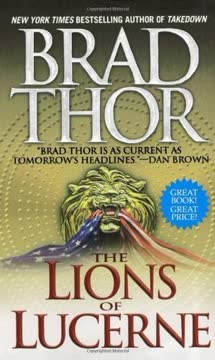
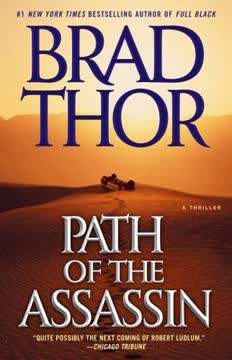
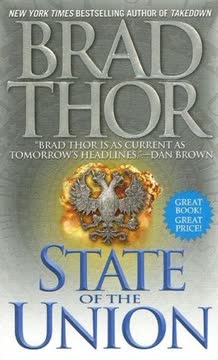
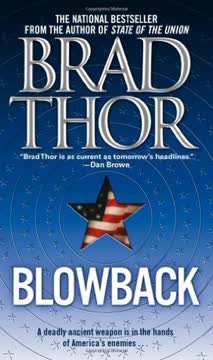
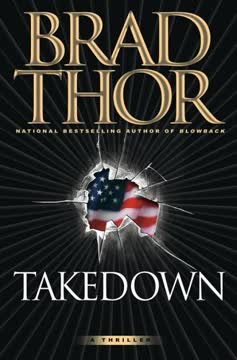
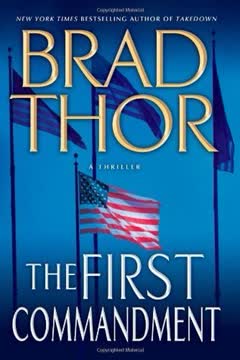
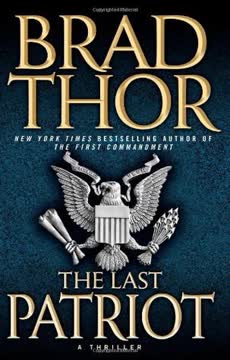
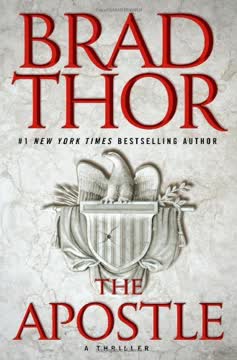
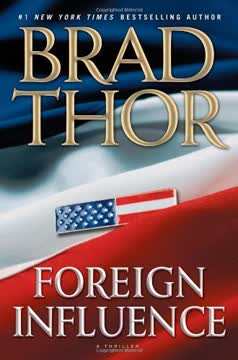
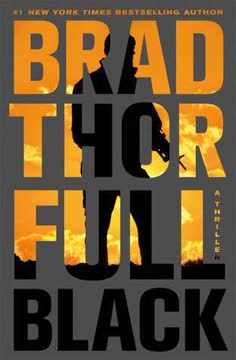
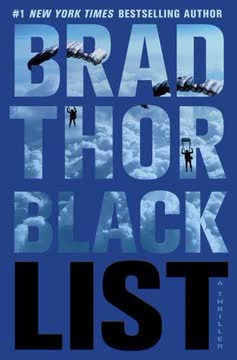
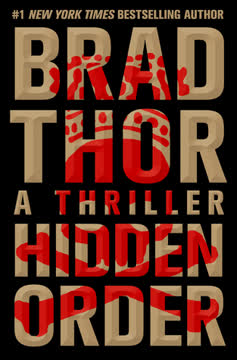
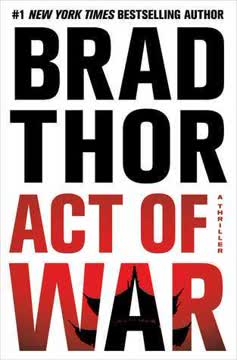
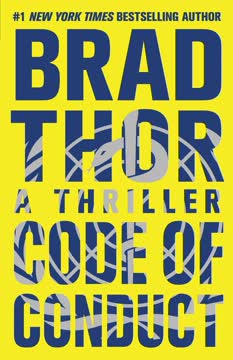
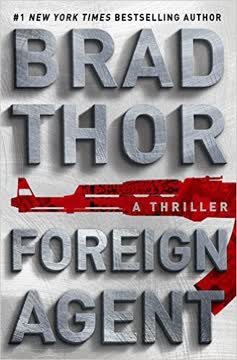
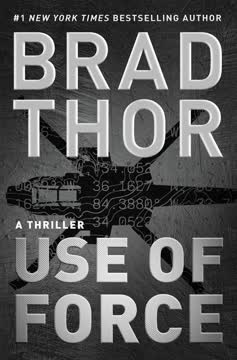
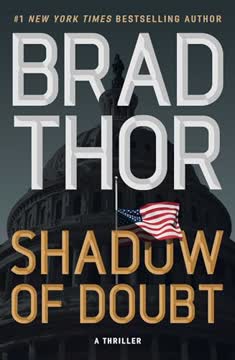
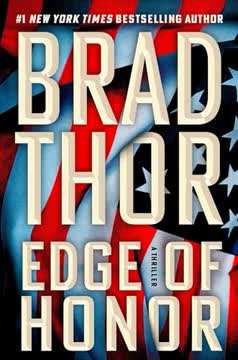
Similar Books
Download PDF
Download EPUB
.epub digital book format is ideal for reading ebooks on phones, tablets, and e-readers.
